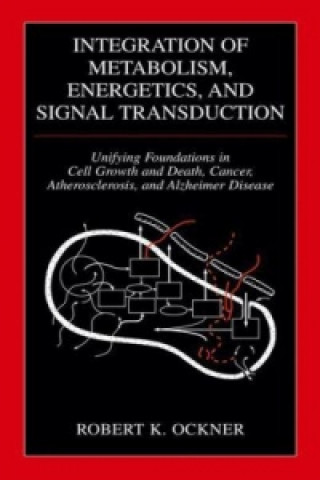
Kézbesítés
Vásárlási tanácsadó





Nem vált be? Semmi gond! Nálunk 30 napon belül visszaküldheti
 Ajándékutalvány
bármilyen értékben
Ajándékutalvány
bármilyen értékben
Ajándékutalvánnyal nem nyúlhat mellé. A megajándékozott az ajándékutalványért bármit választhat kínálatunkból.
Integration of Metabolism, Energetics, and Signal Transduction
 Angol
Angol
 310 b
310 b
30 nap a termék visszaküldésére
Ezt is ajánljuk


This book demonstrates how metabolism and energetics are directly linked to those signal transduction pathways that are essential to survival of the cell, the organism, and the species. Recurring patterns of interaction among metabolism, energetics, and signal transduction are fundamental in diverse aspects of human health and disease. This book explores these phenomena in relation to cell growth and death, cancer, atherosclerosis and Alzheimer disease. Part I of the book explores the origins and theory of integration.§Topics covered in Part II include: nutrient and energy metabolism in cell proliferation; fatty acids and growth regulation; mitochondrial function in cell growth and death; metabolic effects of antiproliferative agents; fatty acids and mitochondria, cell growth and injury; metabolism and gene expression.§Part III of the book deals with energetics of neuronal activation; utilization of oxidizable substrates in the brain; astrocyte metabolism and astrocyte-neuron interaction; neuronal energy metabolism in the brain; astroctyes as metabolic buffer and mediator of neuronal injury; and metabolic factors in the pathogenesis of Alzheimer Disease.§"Dr. Ockner has written a fascinating and original book which explores potential metabolic links to neurodegeneration. He takes a fresh look at metabolic pathways involving interaction between astrocyte and neuron that are important for brain health and may play a significant role in the pathogenesis of Alzheimer disease and other normal and pathological phenomena. Dr. Ockner has a distinguished research career in fatty acid metabolism and the fatty acid binding proteins and writes with clarity upon this under-explored aspect of the brain in health and disease. Not only is his book important for understanding links between systemic and cerebral metabolism in neurodegeneration, but is a must read for scientists with an interest in the connection between metabolic pathways and brain function." Bruce Miller, M.D.§Professor of Neurology§Clinical director of the Memory and Aging Center§University of California, San FranciscoThis book demonstrates how metabolism and energetics are directly linked to those signal transduction pathways that are essential to survival of the cell, the organism, and the species. Recurring patterns of interaction among metabolism, energetics, and signal transduction are fundamental in diverse aspects of human health and disease. This book explores these phenomena in relation to cell growth and death, cancer, atherosclerosis and Alzheimer disease. Part I of the book explores the origins and theory of integration.§Topics covered in Part II include: nutrient and energy metabolism in cell proliferation; fatty acids and growth regulation; mitochondrial function in cell growth and death; metabolic effects of antiproliferative agents; fatty acids and mitochondria, cell growth and injury; metabolism and gene expression.§Part III of the book deals with energetics of neuronal activation; utilization of oxidizable substrates in the brain; astrocyte metabolism and astrocyte-neuron interaction; neuronal energy metabolism in the brain; astroctyes as metabolic buffer and mediator of neuronal injury; and metabolic factors in the pathogenesis of Alzheimer Disease.INTEGRATION OF METABOLISM,§ENERGETICS, AND SIGNAL TRANSDUCTION§Unifying Foundations in Cell Growth and Death, Cancer,§Atherosclerosis, and Alzheimer Disease§ROBERT K. OCKNER §"Dr. Ockner has written a fascinating and original book which explores potential metabolic links to neurodegeneration. He takes a fresh look at metabolic pathways involving interaction between astrocyte and neuron that are important for brain health and may play a significant role in the pathogenesis of Alzheimer disease and other normal and pathological phenomena. Dr. Ockner has a distinguished research career in fatty acid metabolism and the fatty acid binding proteins and writes with clarity upon this under-explored aspect of the brain in health and disease. Not only is his book important for understanding links between systemic and cerebral metabolism in neurodegeneration, but is a must read for scientists with an interest in the connection between metabolic pathways and brain function." Dr. Bruce Miller,§Professor of Neurology§Clinical director of the Memory and Aging Center§University of California, San Francisco §"I find this book to be a commendable and comprehensive undertaking as it encompasses an evaluation of a wide area of scientific research. Researchers working in lipid metabolism to those interested in mitochondrial energetics and in the mechanisms of signal transduction pathways in cancer and Alzheimer disease will benefit from this book." M.A.Q. Siddiqui, §Professor and Chairman of the Department of Anatomy and Cell Biology §SUNY Downstate, Brooklyn, NY§Robert K. Ockner, M.D. is Professor of Medicine at the University of California, San Francisco, and is former Director of the UCSF Liver Center and Division of Gastroenterology. He and colleagues initially identified and characterized the cytosolic fatty acid binding proteins. He is a graduate of the Harvard Medical School and completed clinical and research training at Boston City Hospital, National Institutes of Health, and Massachusetts General Hospital. §Cover art by Sadie McFarlane
Információ a könyvről
 Angol
Angol




 Hogyan vásároljunk
Hogyan vásároljunk




























